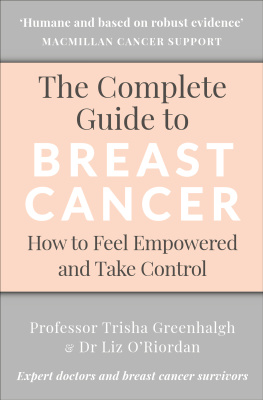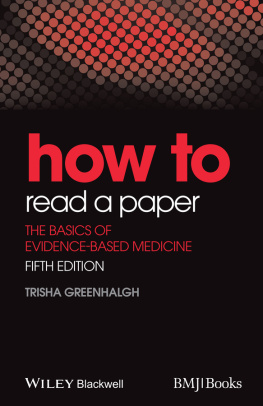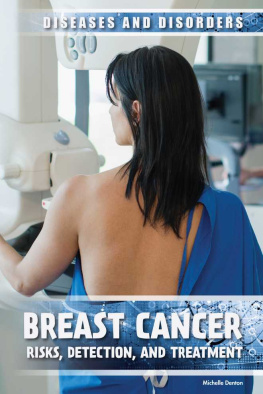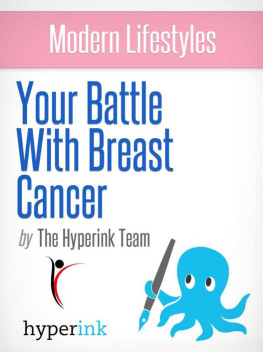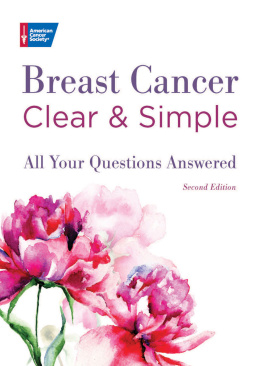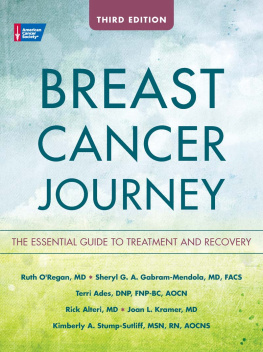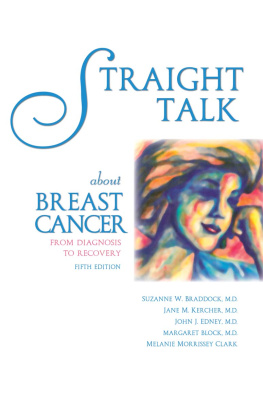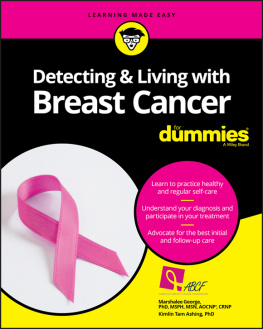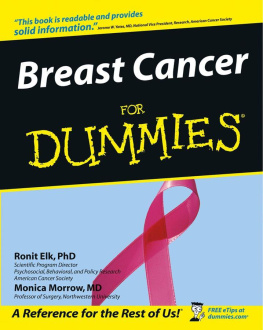CONTENTS
ABOUT THE BOOK
The book you can trust to support you at every stage of your treatment and beyond
Professor Trisha Greenhalgh, an academic GP, and Dr Liz ORiordan, a Consultant Breast Cancer Surgeon, are not only outstanding doctors, but they have also experienced breast cancer first-hand.
The Complete Guide to Breast Cancer brings together all the knowledge they have gathered as patients and as doctors to give you and your family a trusted, thorough and up-to-date source of information. Designed to empower you during your breast cancer treatment, it covers:
-Simple explanations of every breast cancer treatment
-Coping with the emotional burden of breast cancer
-Frank advice about sex and relationships
-Staying healthy during and after treatment
-Dealing with the fear of recurrence
-Living with secondary breast cancer
Packed full of all the things the authors wished theyd known when they were diagnosed, and tips on how to cope with surgery, radiotherapy, chemotherapy and beyond, this is the only book you need to read to guide you through your breast cancer diagnosis.
A much needed guide which is both humane and based on robust evidence. Macmillan Cancer Support
ABOUT THE AUTHORS
Trisha Greenhalgh
Professor Trisha Greenhalgh is a GP and internationally recognised academic who works as a senior professor at the University of Oxford and has appeared on Womans Hour and The Today Programme. She is the author of over 400 academic papers and 15 textbooks, including the bestselling book How to Read a Paper: The Basics of Evidence-Based Medicine.
Liz ORiordan
Liz ORiordan is a Consultant Oncoplastic Surgeon who blogs about her experiences as a doctor and patient here: liz.oriordan.co.uk. She has written articles for the Huffington Post, Macmillan, The Pool and Grazia. Her TEDx talk is called Jar of Joy.
CHAPTER 1
JOINING THE CANCER CLUB
WEVE BEEN THERE .
The moment you find out that you have breast cancer, your life changes forever. Your first reaction is likely to be one of shock, horror or disbelief. You may worry about what the future holds, and whether you will live long enough to see it. Most people who get breast cancer in the UK go on to live for many years and most do not die of breast cancer, but some will get a recurrence. However long you live for, you will never return to being a non-cancer patient.
For the rest of your life, you will be in one of two phases:
1. Having active treatment. This will include some or all of surgery, radiotherapy, chemotherapy, hormone therapy and other targeted therapies.
2. Living after active treatment. This is sometimes known as survivorship. Your life will be interrupted by periodic hospital appointments, mammograms or scans, adjusting to the side effects of breast cancer treatment and coping with the possibility that your cancer might come back.
If your cancer comes back called secondary cancer you enter a third phase, and this can happen even 20 years after your first diagnosis. This can, of course, be very upsetting, and we cover this in detail in Chapter 23 ().
The first couple of weeks after diagnosis can be a period of uncertainty and confusion. You have to deal with the fact that you have got breast cancer, as well as taking in a lot of information about the treatments you need. Friends and relatives may ask you a lot of questions that you dont yet know the answers to. It can be hard to believe you have cancer because you dont feel (or look) ill. This is because, unless you have secondary breast cancer, the only symptom you are likely to have is a lump (and some people dont even have that). Unlike some other kinds of cancer, early breast cancer doesnt make you feel tired or short of breath or generally unwell.
WHY ME?
This is often the first question that people ask. The important thing to remember is that getting breast cancer is not your fault. The two biggest reasons why women get breast cancer are simply because they are women, and are getting older. Most breast cancers happen in women over the age of 50. Your breasts are made up of glandular tissue and fatty tissue. If your breasts have more glandular tissue than fat (known as dense breasts), this can also increase your risk. All of these things are outside of your control. In a nutshell, most breast cancers are sensitive to the female hormone oestrogen, and the older you are, the more oestrogen you have been exposed to in your lifetime. The lifetime risk of a woman developing breast cancer is 1 in 8. While you are in your twenties, your risk of developing breast cancer is very small (1 in 2,000 women). During your sixties, your risk is higher (1 in 15 women).
There are other lifestyle factors that have been proven to increase the risk of developing breast cancer, and these include: being overweight, not exercising regularly and drinking alcohol (more than the recommended guidance of two units a day), especially if you are post-menopausal. That being said, you can still get breast cancer if you are slim and exercise regularly, like we did.
There are other things that have been shown to increase the risk of breast cancer, such as taking the oral contraceptive pill or hormone replacement therapy (HRT) for many years, not breastfeeding your children or not having children at all. However, there is no way to prove that the reason you have breast cancer is because (for example) you took the pill when you were younger. For most of us, it is just bad luck, and again, it is not our fault. Men get breast cancer too, although this is rare (the lifetime risk of a man developing breast cancer is 1 in 870). We have written a separate chapter (Chapter 20, ) specifically for men with breast cancer.
A very small proportion of breast cancers, around 5 in every 100 cases, are linked to a strong family history of breast cancer, in which an altered (mutated) gene is passed from a parent to a child. The most well-known mutations are in the BRCA1 and BRCA2 genes. An altered BRCA gene means that you have a 6080 per cent chance of developing breast cancer and a 1060 per cent chance of developing ovarian cancer in your lifetime. Other rarer genetic mutations include the TP53 gene and conditions like Peutz-Jegher syndrome and Cowdens syndrome. If several people on one side of your family have had breast or ovarian cancer below the age of 50, the altered gene might run in your family. Your GP or surgeon will be able to advise you whether you might be eligible for a gene test following genetic counselling. A full account of BRCA testing and what it involves is beyond the scope of this book, but the charity website Breast Cancer Care (www.breastcancercare.org.uk) is a good place to start looking for accurate information.
INFORMATION GATHERING
On the day you are diagnosed, you will know very little about your own breast cancer. You may have seen family or friends go through treatment, but they are not you. Even if you have done a lot of reading beforehand, have looked after people with breast cancer or are a medical expert in breast cancer yourself (like Liz was), you have never been a breast cancer patient before. And that is a completely different ball game.
At this stage, you may just want to sit back, go with the flow and let your medical team treat you without asking many questions. However, you may want to find out everything you can about breast cancer. You probably dont even know where (or what) to start reading or what (if anything) to start worrying about. Even if you do not actively seek out information, you will soon become an expert in how

